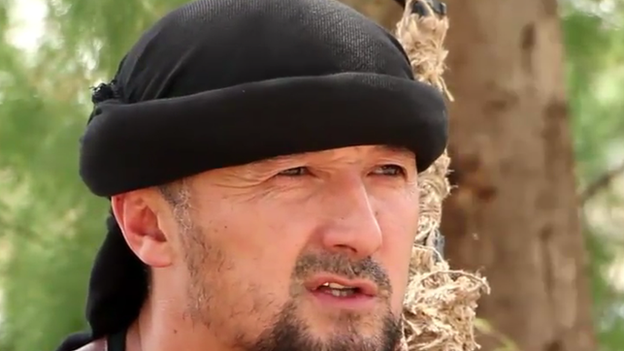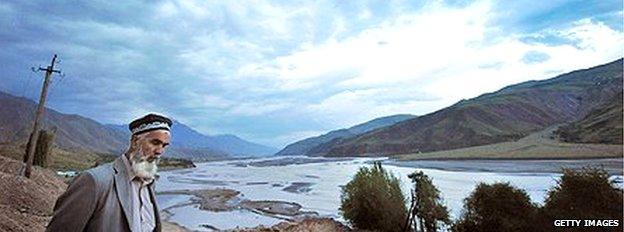Tajikistan special forces chief Gulmurod Khalimov 'joins IS'
- Published

Gulmurod Khalimov has been missing since the beginning of May
Tajikistan's special forces chief has appeared in a video claiming to have joined Islamic State forces in Syria.
Gulmurod Khalimov is seen in the footage dressed in black and holding a gun. He went missing in early May.
He says he joined IS in protest at Tajikistan's policy towards religion, which he says is anti-Islamic.
Hundreds of Central Asians are thought have left for Syria, but this is the first known case of such a high profile officer joining the militants.
The authorities in Tajikistan have refused to comment on his whereabouts since his disappearance, reports the BBC's Abdujalil Abdurasulov in Almaty.
'Slaughter'
Khalimov used to fight extremists at home and was one of the best trained officers in the country, our correspondent says.
In the video, which is believed to have been recorded in a Syrian camp, he says he plans to return to Tajikistan and "bring slaughter".
He voices his disillusionment with the Tajik police and talks about the hardship of thousands of Tajik working migrants in Russia.

Analysis: Khayrullo Fayz, BBC Central Asian Service

Tajikistan has been stable since the end of the civil war which followed independence
The news of a high profile Tajik commander joining IS is bound to have shocked Tajikistan's authoritarian government. YouTube - where Gulmurod Khalimov's video could be seen - was blocked almost immediately. So far no officials have been available for comment.
It's an unprecedented case for Tajikistan.
Khalimov did not belong to the thousands of Muslims in the country routinely targeted by a government intent on fighting what it sees as extremism, but was part of the very security establishment meant to counter such threats.
Many in Tajikistan are puzzled by the speed of his departure; after all he was still working in the country in April. With Central Asian militants now battling Afghan security forces just across the border in Afghanistan, the authorities in Dushanbe will be extremely concerned about the wider implications.
Khalimov's position and profile are significant enough to potentially influence other members of the security forces.

There are no official figures for the number of Tajik citizens fighting alongside Islamic State, but in January sources in the security services were quoted saying they range from 200 to 500.
Central Asian fighters have also formed their own groups such as Sabri Jamaat and Imam Bukhari Jamaat, the BBC's Abdujalil Abdurasulov says.
Many of these militants have reportedly been seen in major battles in Syrian cities, including Aleppo, Kobane and lately in Palmyra.